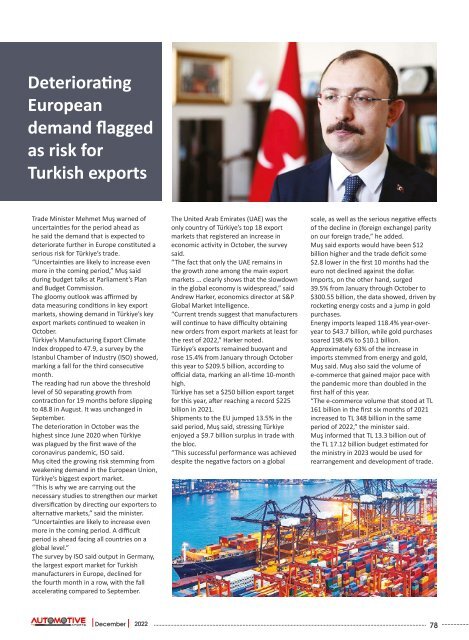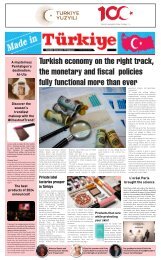Automotive Exports December 2022
Create successful ePaper yourself
Turn your PDF publications into a flip-book with our unique Google optimized e-Paper software.
Deteriorating<br />
European<br />
demand flagged<br />
as risk for<br />
Turkish exports<br />
Trade Minister Mehmet Muş warned of<br />
uncertainties for the period ahead as<br />
he said the demand that is expected to<br />
deteriorate further in Europe constituted a<br />
serious risk for Türkiye’s trade.<br />
“Uncertainties are likely to increase even<br />
more in the coming period,” Muş said<br />
during budget talks at Parliament’s Plan<br />
and Budget Commission.<br />
The gloomy outlook was affirmed by<br />
data measuring conditions in key export<br />
markets, showing demand in Türkiye’s key<br />
export markets continued to weaken in<br />
October.<br />
Türkiye’s Manufacturing Export Climate<br />
Index dropped to 47.9, a survey by the<br />
Istanbul Chamber of Industry (ISO) showed,<br />
marking a fall for the third consecutive<br />
month.<br />
The reading had run above the threshold<br />
level of 50 separating growth from<br />
contraction for 19 months before slipping<br />
to 48.8 in August. It was unchanged in<br />
September.<br />
The deterioration in October was the<br />
highest since June 2020 when Türkiye<br />
was plagued by the first wave of the<br />
coronavirus pandemic, ISO said.<br />
Muş cited the growing risk stemming from<br />
weakening demand in the European Union,<br />
Türkiye’s biggest export market.<br />
“This is why we are carrying out the<br />
necessary studies to strengthen our market<br />
diversification by directing our exporters to<br />
alternative markets,” said the minister.<br />
“Uncertainties are likely to increase even<br />
more in the coming period. A difficult<br />
period is ahead facing all countries on a<br />
global level.”<br />
The survey by ISO said output in Germany,<br />
the largest export market for Turkish<br />
manufacturers in Europe, declined for<br />
the fourth month in a row, with the fall<br />
accelerating compared to September.<br />
The United Arab Emirates (UAE) was the<br />
only country of Türkiye’s top 18 export<br />
markets that registered an increase in<br />
economic activity in October, the survey<br />
said.<br />
“The fact that only the UAE remains in<br />
the growth zone among the main export<br />
markets ... clearly shows that the slowdown<br />
in the global economy is widespread,” said<br />
Andrew Harker, economics director at S&P<br />
Global Market Intelligence.<br />
“Current trends suggest that manufacturers<br />
will continue to have difficulty obtaining<br />
new orders from export markets at least for<br />
the rest of <strong>2022</strong>,” Harker noted.<br />
Türkiye’s exports remained buoyant and<br />
rose 15.4% from January through October<br />
this year to $209.5 billion, according to<br />
official data, marking an all-time 10-month<br />
high.<br />
Türkiye has set a $250 billion export target<br />
for this year, after reaching a record $225<br />
billion in 2021.<br />
Shipments to the EU jumped 13.5% in the<br />
said period, Muş said, stressing Türkiye<br />
enjoyed a $9.7 billion surplus in trade with<br />
the bloc.<br />
“This successful performance was achieved<br />
despite the negative factors on a global<br />
scale, as well as the serious negative effects<br />
of the decline in (foreign exchange) parity<br />
on our foreign trade,” he added.<br />
Muş said exports would have been $12<br />
billion higher and the trade deficit some<br />
$2.8 lower in the first 10 months had the<br />
euro not declined against the dollar.<br />
Imports, on the other hand, surged<br />
39.5% from January through October to<br />
$300.55 billion, the data showed, driven by<br />
rocketing energy costs and a jump in gold<br />
purchases.<br />
Energy imports leaped 118.4% year-overyear<br />
to $43.7 billion, while gold purchases<br />
soared 198.4% to $10.1 billion.<br />
Approximately 63% of the increase in<br />
imports stemmed from energy and gold,<br />
Muş said. Muş also said the volume of<br />
e-commerce that gained major pace with<br />
the pandemic more than doubled in the<br />
first half of this year.<br />
“The e-commerce volume that stood at TL<br />
161 billion in the first six months of 2021<br />
increased to TL 348 billion in the same<br />
period of <strong>2022</strong>,” the minister said.<br />
Muş informed that TL 13.3 billion out of<br />
the TL 17.12 billion budget estimated for<br />
the ministry in 2023 would be used for<br />
rearrangement and development of trade.<br />
<strong>December</strong> <strong>2022</strong> 78

















